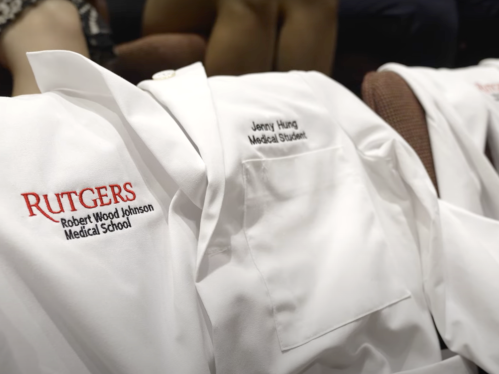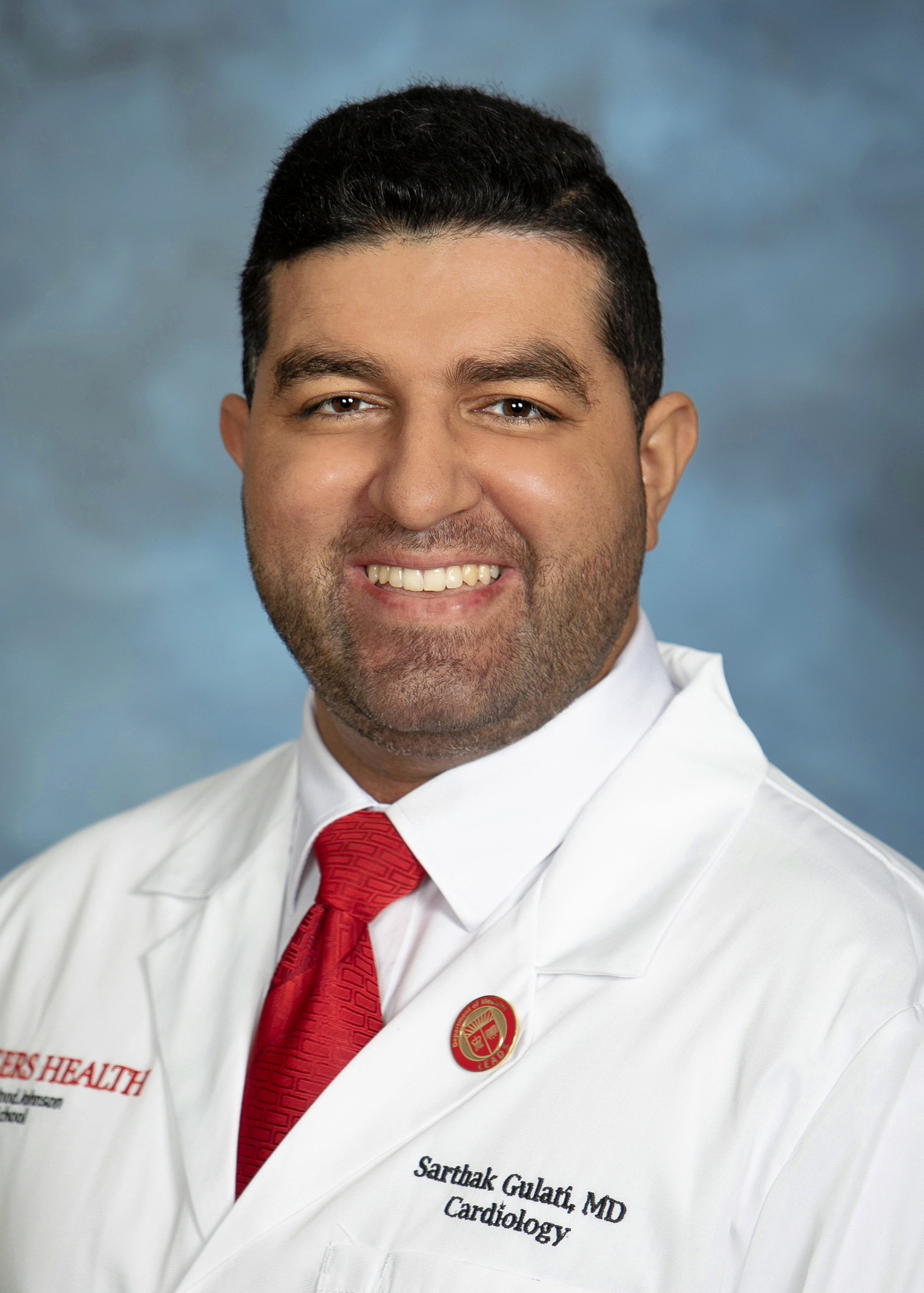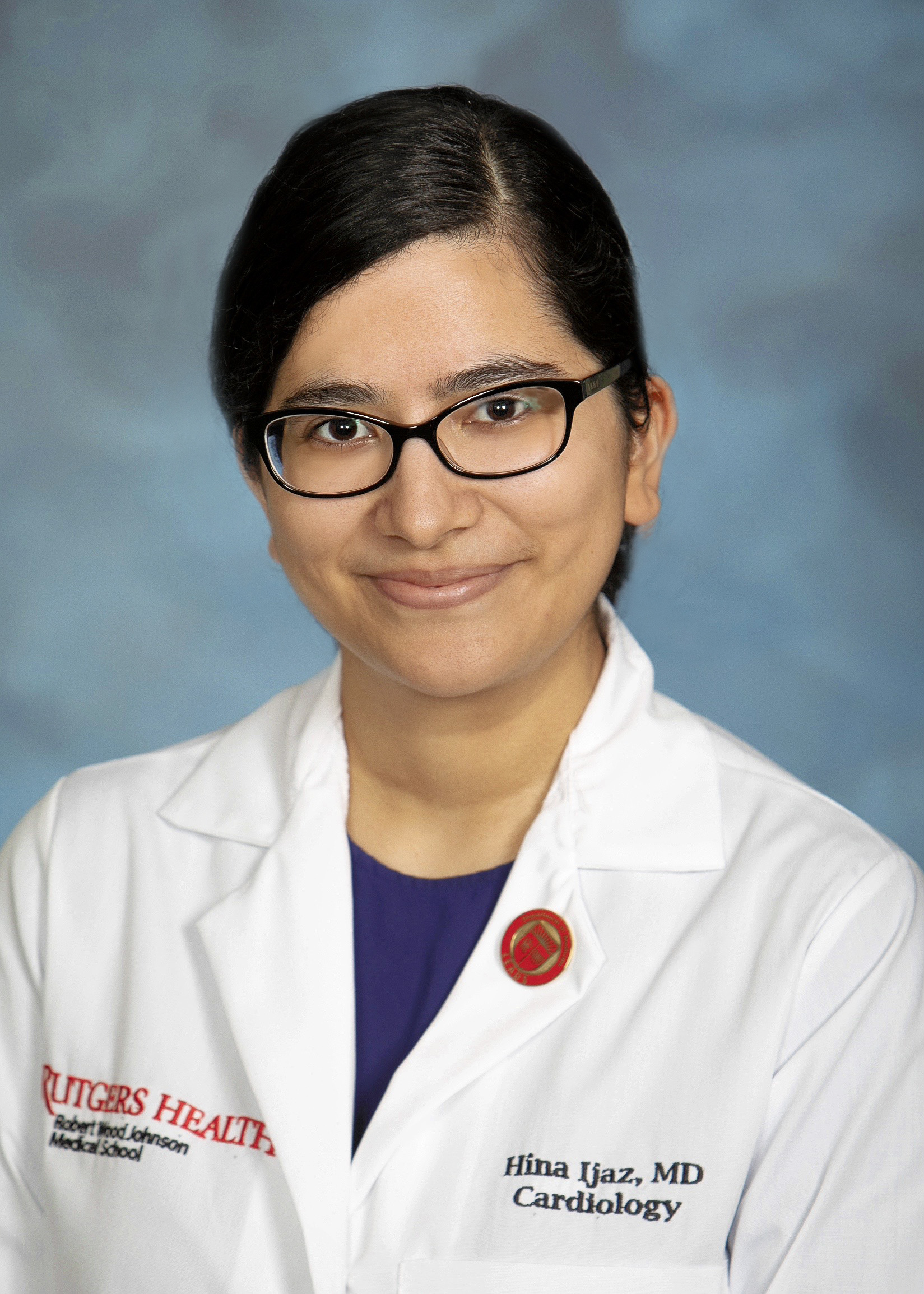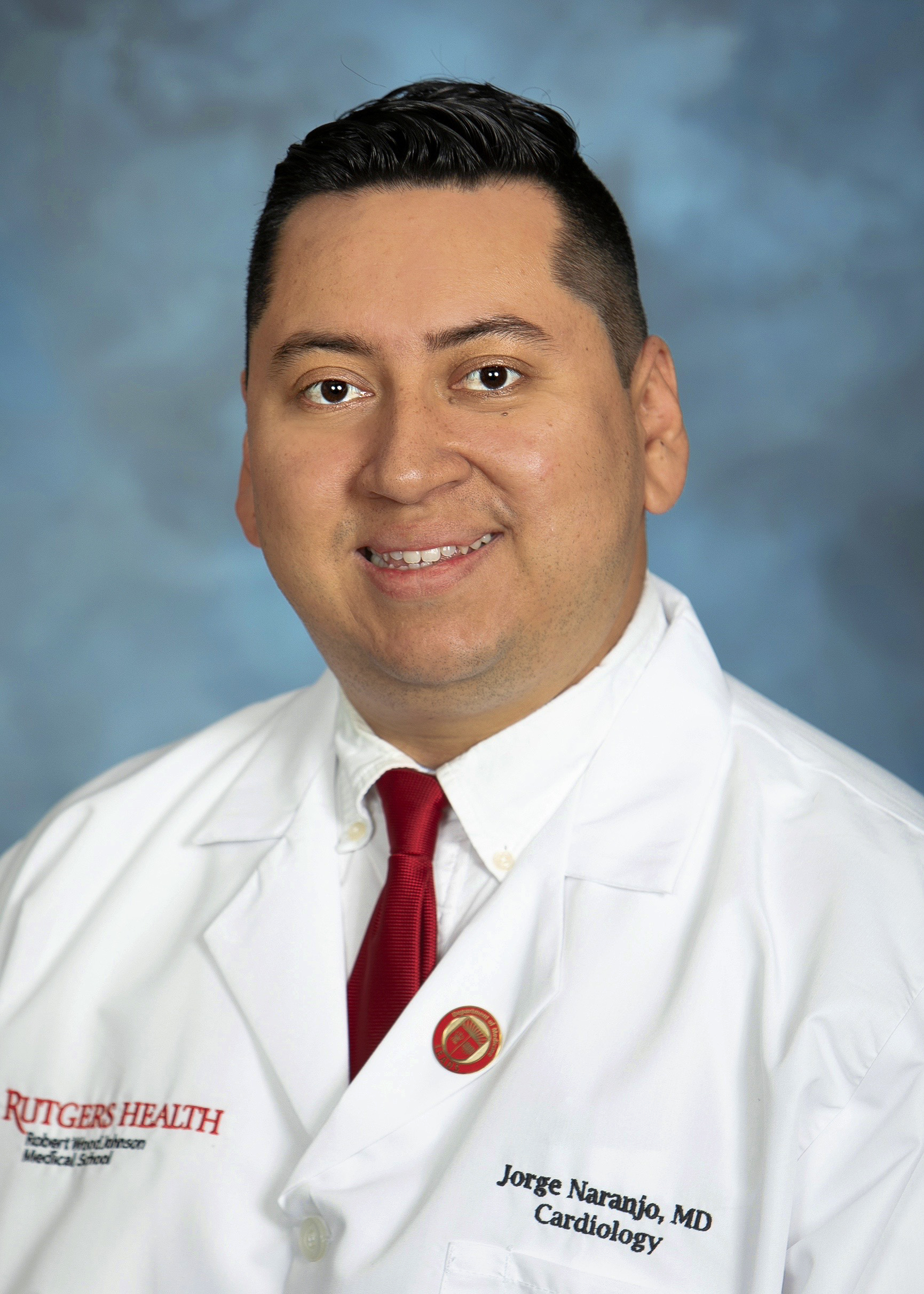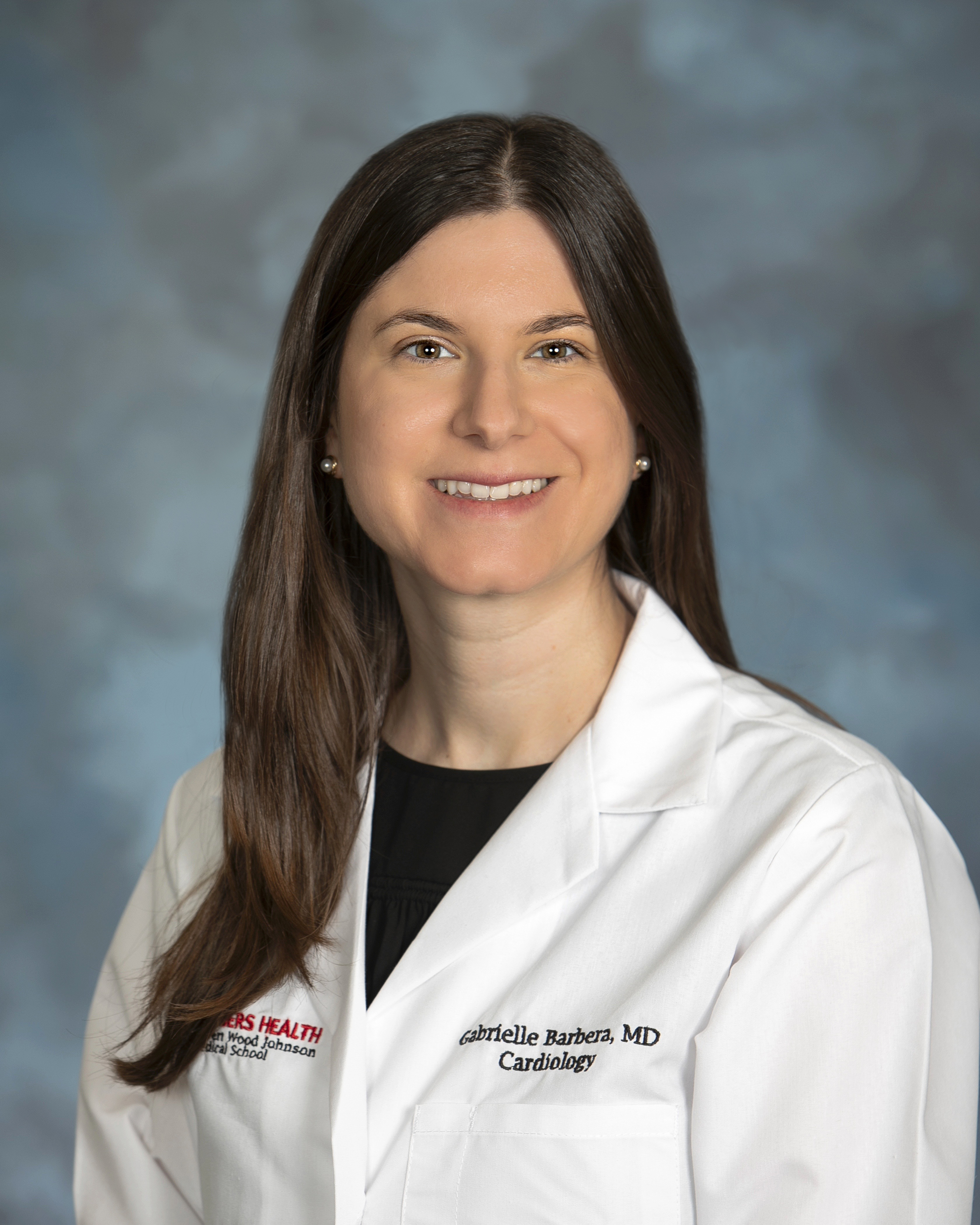Cardiology Fellowship
The training mission of the RWJMS Cardiology Fellowship is to prepare clinical and academic cardiologists. Our goal is to prepare fellows to take on leadership roles in cardiovascular medicine, basic and clinical research and clinical cardiology. The fellows are an integral part of the division and encouraged to always be strong advocates for all patients under their care. The faculty is committed to making a valuable contribution to the next generation of clinical and academic cardiologists, molding innovators who are committed to lifetime of learning. All fellows must be intimately involved in a research project during the course of their fellowship and are strongly encouraged to develop a research plan with their research mentor early in the course of their fellowship. Opportunities exist in a variety of research disciplines.
The duration of the cardiovascular disease fellowship program is three years with fifteen accredited positions in the general program emphasizing preparation in academic cardiology. Throughout the duration of their training, with close mentorship from the faculty, the fellows serve as consultants for critically ill medical and surgical patients, provide care to their own patients in an outpatient setting. The fellows are trained to perform and interpret the vast array of invasive and non-invasive diagnostic and therapeutic cardiovascular procedures. Comprehensive training in all major aspects of clinical cardiology is combined with training in basic and clinical cardiovascular research.
Our fellowship program provides an academically and clinically rigorous training experience in general cardiology, as well as advanced training in clinical cardiology subspecialties. The aims of the program are to provide the trainee with the basic and clinical knowledge, procedural skills, clinical judgment, professionalism and interpersonal skills, and abilities necessary to continue to hone these skills through the course of a long career. Fellowship training will prepare fellows to function not only as outstanding cardiologists, but also as subspecialists.
All training is completed at Rutgers Robert Wood Johnson University Hospital (RWJUH). The training program offers training in clinical subspecialties of cardiology including nuclear cardiology, echocardiography, interventional cardiology, structural cardiology, electrophysiology, and advanced heart failure/transplant cardiology. Training is also offered in subspecialities such as advanced imaging (cardiac PET, CT, and MRI), amyloidosis/infiltrative cardiomyopathies, cardio-obstetrics, and cardio-oncology.
The core clinical training for the program is based on the ACC Revised Recommendations for Training in Adult Cardiovascular Medicine Core Cardiology Training IV (COCATS 4) published in 1995 and updated in 2015. Training is conducted in compliance with the Accreditation Council for Graduate Medical Education (ACGME) program requirements for general fellowship education in the subspecialties of internal medicine and the specific requirements for fellowship education in cardiovascular disease.
Fellows participate in didactic sessions and conferences that establish the core curriculum, with a combination of board review, fellow-lead and faculty-lead lectures, case-based review, and journal club. We also have weekly cardiology grand rounds, with invited external experts to discuss a unique focus of their subspecialty or topic of choice.
A final aspect of the curriculum involves fellow involvement in teaching. This occurs in several settings, including direct clinical teaching of internal medicine residents on the inpatient cardiology services, as well as assisting in the early training of new cardiology fellows. Fellows are expected to give didactic lectures at the various subspecialty conferences and the cardiology clinical conference lecture series.
Educational Curriculum
-
The curriculum for the Cardiology Fellowship Program is a three-year ACGME-accredited training program. There are 15 fellows in the program, with responsibilities distributed according to their level of experience.
The cardiology fellow spends at least two month-long rotations during the three-year fellowship in the following areas: Cardiac Critical Care Unit; inpatient consultation services; outpatient consultations; electrophysiology; echocardiography; advanced heart failure; catheterization laboratory; exercise stress physiology; and nuclear cardiology. Fellows participate in research projects with any of the full-time faculty members in the division.
-
Cardiac Consult Service
The cornerstone of the clinical training at Rutgers Robert Wood Johnson University Hospital is the cardiac consult service, which exposes fellows to a diverse and complex patient population. Fellows serve as the primary decision maker for complex valve disease, heart failure, acute coronary syndromes, arrhythmias and other cardiac conditions, with oversight by attending faculty. There is continuity of many inpatients to the outpatient setting where fellows can continue to participate in their care by directly seeing them in their own fellow’s clinic. The consult service also provides cardiology fellows with opportunities for teaching both medical residents and medical students on bedside rounds. The consult service serves as a robust learning experience that is core to the clinical training of our fellows.
Non-Invasive Cardiovascular Program
Our program provides the full spectrum of diagnostic cardiac ultrasound services including 2-dimensional and Doppler transthoracic echocardiography with and without contrast, 3-dimensional transthoracic echo and strain; stress echocardiography, including bicycle and treadmill exercise, as well dobutamine adjunctive pharmacotherapy; Trans-esophageal echocardiography including 3D imaging
During their first year, training is designed to assist the cardiovascular fellow in developing skills in the performance of diagnostic ultrasound, as well as, mastering basic principles and achieving competence in study interpretation. Senior sonographers supervise the fellow offering direct instruction in performance of the echocardiographic examination. In addition to performing and interpreting their own studies, fellows also attend daily reading sessions. During the second-year fellows, emphasis is placed on interpretive skills and advanced procedures, such as stress echo studies and trans-esophageal echocardiography. All fellows graduate with level 2 training and most take echocardiography boards before they graduate. Fellows who exhibit a particular interest in non-invasive imaging are encouraged to pursue research projects under supervision of the laboratory staff.
Exercise Physiology Laboratory – Nuclear Cardiology
Nuclear cardiology at the Robert Wood Johnsons University Heart Center provides various types of cardiac stress tests that help to identify and diagnose heart disease. The educational initiative is jointly run between the cardiology and radiology services. The laboratory is fully equipped to perform SPECT, PET and Cardiac MRI. Fellows learn the integral role of cardiac stress testing in the practice of clinical cardiology, as well as its limitations, by performing and interpreting studies. The full spectrum of diagnostic services, with and without adjunctive radionuclide imaging, is provided, including: exercise stress testing using treadmill or bicycle, stress testing using atrial pacing, pharmacological stress testing using adenosine, dobutamine or dipyridamole, and metabolic stress testing.
Cardiac Catheterization Laboratory
Each fellow is expected to spend at least 4 months in the cardiac catheterization laboratory. Fellows are lead operators on diagnostic procedures in the Cardiac Catheterization Laboratory, a state-of-the-art suite of five rooms with high-resolution digital fluoroscopy units. A wide variety of diagnostic and interventional procedures are performed. By virtue of being a tertiary referral center, as well as, serving the local New Brunswick community and its environs, Robert Wood Johnson University Hospital exposes the trainee to a varied and complex case load. Fellows gain experience in the appropriateness of interventions, contraindications and potential complications of cardiac catheterization and interventions for assessment of coronary, valvular, myocardial, and adult congenital heart disease. The fellows learn the appropriateness of coronary bypass surgery versus percutaneous revascularization and post-procedural care. Fellows are taught to integrate results obtained from noninvasive imaging modalities and are exposed to an interdisciplinary approach in the formulating the care of each particular patient. Fellows present cases in which they were actively involved in weekly cardiac catheterization conferences and attend monthly multidisciplinary quality improvement conferences. Research opportunities are available and encouraged. For fellows interested in pursuing a career in interventional cardiology an ACGME accredited Advanced Interventional Cardiology Fellowship is available.
Coronary Care Unit
Patients requiring acute care for advanced heart failure (including those awaiting transplant), peri-procedural management of high-risk coronary disease and malignant arrhythmias, patients post cardiac arrest and those in need of extracorporeal ventricular support are admitted to a state of the art 14-bed unit, reserved for the management of these critically-ill patients. During this rotation, fellows are exposed to extremely complex patients and not only learn to manage these patients but take on a leadership role, mentoring residents and medical students during the rotation.
Heart Failure and Transplantation
The management of patients with advanced heart failure at Robert Wood Johnson is a team effort. The fellows are an integral component of the service working closely with physicians and non-physicians alike. This multidisciplinary team consists of members from the heart failure, electrophysiology and cardiac surgery services; caring for patients with advanced disease. The fellows participate in transplant meetings and gain a solid grasp in the management of chronic severe heart failure, pulmonary hypertension, assessment of candidates for transplantation and left ventricular mechanical circulatory support.
Electrophysiology
The Arrhythmia Diagnosis and Treatment program provides the full spectrum of diagnostic and therapeutic cardiovascular services. Diagnostic cardiac electrophysiologic studies are performed, as well as therapeutic cardiac electrophysiologic procedures, including radiofrequency transcatheter ablation, insertion of temporary and permanent pacemakers, and implantation of automatic defibrillators. The cardiac electrophysiology laboratory comprises a state-of-the-art facility accommodating the newest technologies, needs and volume. It’s equipped with new X-ray imaging, mapping systems and a Stereotaxis catheter navigation system. Second-year fellows on the electrophysiology rotation gain competence in the interpretation of commonly performed electrophysiology studies, manage inpatients with arrhythmias or dyssynchrony, learn indications for pacemaker and ICD implementation and become experienced in programming and interrogation of devices. Research is available and encouraged. We are in the process of offering an ACGME accredited Clinical Cardiac Electrophysiology Fellowship for fellows interested in continuing in a career as an electrophysiologist.
Cardiac Surgical Intensive Care
Fellows rotating on the Cardiology Consult service follow patients in the surgical intensive care unit gaining experience in the postoperative care of cardiac surgical patients. Patients on the surgical service often undergo complex procedures with significant comorbidities, so fellows learn the ramifications of the technical and anatomic problems tackled during the operation. Fellows are encouraged to attend surgical cases in the operating room, to gain an appreciation of the complexity of cardiac bypass pump physiology, cardiac transplantation, insertion of left ventricular assist devices and the intricacies of intraoperative management. During their elective time fellows are encouraged to spend time in the surgical ICU.
Structural Heart Disease
Robert Wood Johnson University hospital has a robust Structural Heart Disease Program which sponsors a 1-year, non-ACGME-accredited fellowship opportunity. Our cardiovascular fellows have the opportunity to rotate through this service during their elective months. The program provides a unique exposure in the interventional and medical therapy of structural heart disease with a special focus on transcatheter valve therapeutics. Fellows will participate in the full spectrum of transcatheter structural heart procedures, including aortic and mitral valve therapies, atrial and ventricular septal occlusion, and left atrial appendage intervention. Pre-procedural evaluation, complication management, and post-operative care will be emphasized. During their elective fellows spend approximately one day per week in the Valve Clinic and rotate on the Inpatient Valve Service. An emphasis will be placed on the longitudinal care of patients from evaluation through hospital admission, treatment, post-operative care, and discharge. Fellows are encouraged to participate in faculty-directed clinical research projects and have the opportunity to participate in the enrollment and follow-up of patients in clinical trials.
Elective
Four months of the third year may be spent as Elective at Robert Wood Johnson University Hospital or any prearranged outside institution. These electives are coordinated through the Division Chief and the Program Director. These have proven to be popular and educationally valuable experiences for fellows in past years.
Research Opportunities
The fellows are required to complete a research project prior to completion of their fellowship. The fellows are given research elective beginning their second year. The fellows are encouraged to identify a research mentor in the first few months of their fellowship. The Cardiovascular Research Program performs the full spectrum of basic, translational and clinical research on inpatients and outpatients with cardiovascular diseases and hypertension. Cardiovascular clinical trials, clinical pharmacology studies and outcomes research are three major areas of research activity. The Division is currently involved in 18 active Clinical Trials.
-

-
-
Completion and passing of all three USMLE step
-
ABIM board certified or board eligible
-
The accepted applicant must obtain a full NJ license (limited license if on visa)
-
A valid ECFMG certificate for all foreign medical graduates
-
Completion of a prior internal medicine residency is required
-
-
Non-Invasive Cardiology
Ruchika Bhargav, DO
Assistant Professor of MedicineSabahat Bokhari, MD
Professor of Medicine
Program Director of Advanced Cardiac Imaging Fellowship and Amyloid Fellowship
Director, Cardiac Amyloidosis and Cardiomyopathy Center
Director, Advanced Cardiac Imaging-RWJUHAndrew Chang, MD
Assistant Professor of MedicineSasha-ann East, MD
Assistant Professor of MedicineYasmin Hamirani, MD
Associate Professor of Medicine
Director, Structural Imaging-RWJUHKameswari Maganti, MD
Professor of Medicine
Section Chief of Non-Invasive Cardiology
Director, Echocardiography Lab-RWJUHAndrew Mendoza, MD
Assistant Professor of MedicineJames D. Mills, MD
Associate Professor of Medicine
Director of General and Preventive CardiologyPartho Sengupta, MD
Henry Rutgers Professor of Cardiology
Chief of the Division of Cardiovascular Diseases and Hypertension
Chief of Cardiac Services-RWJUHDaniel Shindler, MD
Professor of MedicineNidhi Tripathi, MD
Assistant Professor of Medicine
Director, Cardio-OncologyYanting Wang, MD
Assistant Professor of Medicine
Director, Women’s Heart and Cardio-Obstetrics ClinicAdvanced Heart Failure
Chonyang Albert, MD
Assistant Professor of Medicine
Director, Ventricular Assist Device (VAD) & Mechanical Circulatory Support (MCS)-RWJUHJagpreet Grewal, MD
Assistant Professor of MedicineMaya Guglin, MD, PhD
Professor of Medicine
Section Chief of Advanced Heart FailureDeepa Iyer, MD
Associate Professor of Medicine
Director, Cardiac Transplant Program-RWJUHElectrophysiology
Ahmad Halawa, MD
Assistant Professor of MedicineWilliam J. Kostis, PhD, MD
Professor of Medicine
Section Chief of ElectrophysiologyTheodore Maglione, MD
Associate Professor of Medicine
Program Director of the Cardiovascular Fellowship
Director, Electrophysiology Lab-RWJUHInterventional Cardiology
Ashok Chaudhary, MD
Associate Professor of Medicine
Program Director of the Interventional Cardiology FellowshipMichael Huang, DO
Assistant Professor of Medicine
Director, Cardiovascular Intensive Care Unit (CICU)-RWJUHTudor Vagaonescu, MD, PhD
Associate Professor of Medicine
Director, Cardiac Catheterization Laboratories - RWJUH
Cardiology Specialty Fellowships
Salaries and Benefits
The Cardiology Fellowship offers a uniform package of benefits consistent with those provided at all graduate medical educational programs operated by the medical school. Full details are continuously updated by the Office of Graduate Medical Education.
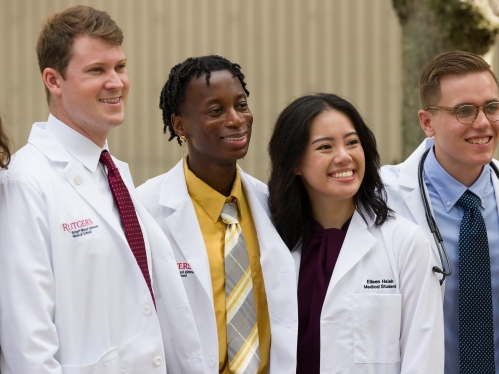
Contact Us
Department of Medicine
Cardiology Fellowship
Clinical Academic Building
125 Paterson Street
New Brunswick, NJ 08901
Phone: 732-235-7664
